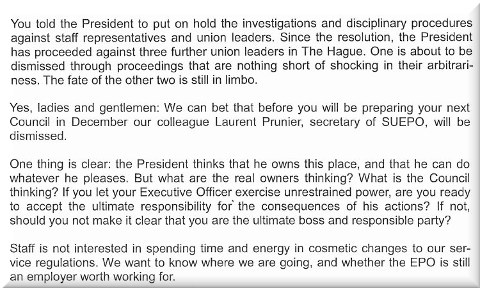

PORTIONS of the meeting minutes of the October 2016 Administrative Council meeting (primarily in German) made their way to us after the meeting had ended and we finally have the full document [PDF]. We are hoping to have an English translation soon.
Is article 4a enforceable in any way? Against whom and by whom? Who is responsible for calling such a conference? It does seem the only way that a semblance of democratic oversight might be possible by this means. Do the member states want to move from a system favoring small and medium enterprises, which benefits the economy and stimulates employment, to a registration system which favors big enterprises with deep pockets, as Battistelli clearly intends. This should be a political decision, taken by elected representatives, not by one man.
And to enter the discussion about whether patent attorneys an or should complain, they are the servants of their masters, who fall into two groups: those who benefit for a high examination standard, and those who do not. It is futile to expect that as a group they can come to the rescue.
Battistelli's presidency has revealed the fatal flaws in the EPC, which provides no practical mechanism for democratic oversight of the workings of the EPO.
Morale will only improve when law, justice and the framework for mutual respect and fairplay are restored at the EPO. There is no excuse for those with the highest of authority not to remove this toxic Enarque and his clique. The country responsible for this toxic entryism at the EPO should now financially and morally support all those victims, including Laurent, who have suffered at the hands of the Enarquien tyrant. A disgrace to the ENA, a disgrace to Europe....
I don't see how a Conference of ministers of the Contracting States could be useful. Battistelli can just ignore its results just as he ignored what the Council requested (twice).
Sorry to ask the same question again: but what can the Council really do, in practice, if Battistelli simply ignores what they ask? He can simply do as he wants and ignore anything the Council pushes at him, can't he? I mean: he already did.
Sure, the Council can open disciplinary proceedings (in theory, I don't think the form these proceedings are supposed to take has been planed in the texts). Sure, the Council can refuse to vote the budget. But the Council cannot stop Battistelli dismantling the European Patent Office if that is his plan. He can continue as long as he gets votes from 10 countries. Even for a second or third term, as far as I can tell.
All he needs are the votes from 10 countries.
Now the question is: why would these 10 countries do that, considering the scandal? The answer is that there are probably 10 countries among the 38 which have little or no patents and few industries to protect, so they don't care. These countries may even see it as an advantage to annoy the big users of the patent system. Maybe they believe that if, e.g., the German small and medium industry cannot use the patent system as effectively as they do, they could develop small and medium industries of their own? Who knows?
Did I understood correctly or are there any Articles I did not consider in the EPC or in other treaties?
What a pity that under the current rules of the EPO, the public at large - but also SUEPO members and all the staff - conveniently cannot hear the version of Prunier and the other dismissed representatives and make up their mind, while the President and you, dear anonymous, are free to provide their own.
Surely the issue of whether or not Mr Prunier should be fired are pretty much irrelevant. The two big issues are:
i) There is a clear lack of due process when the President of the EPO and others can publicly provide comment on the case (including unsubstantiated allegations that cast the EPO in a bad light and are detrimental to its reputation) but the person fired cannot provide any public comment lest he be further punished by losing his pension.
ii) The AC explicitly told the President not to take any further disciplinary action against SUEPO leaders before ensuring that the disciplinary proceedings are fair and seen to be fair. This has not been done so the action to fire Mr Prunier are in direct violation of the AC's instructions to the President. This casts further bad light on the EPO and is detrimental to its reputation.
To my mind the President of the EPO is undertaking actions that are clearly detrimental to the reputation of the EPO. This is something he has been very strict on in relation to his employees and, in the order to be fair, he should be subject to comparable disciplinary proceedings.